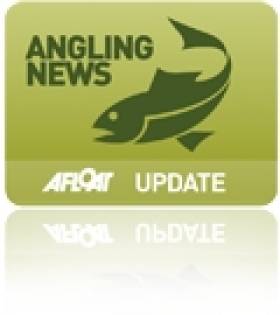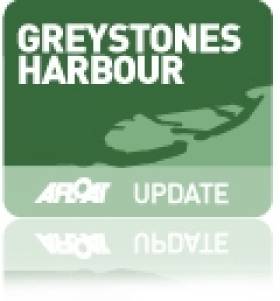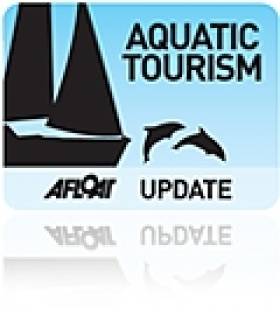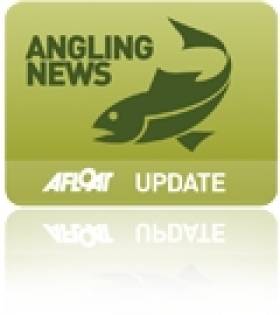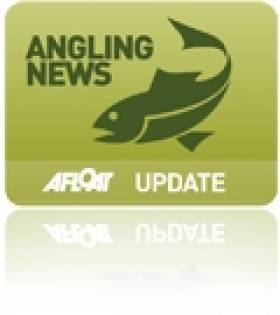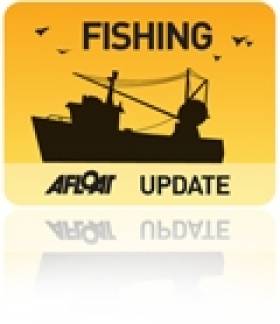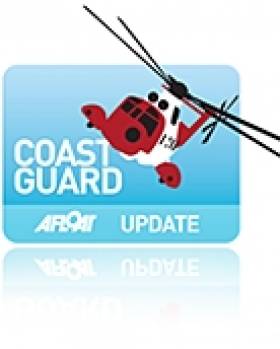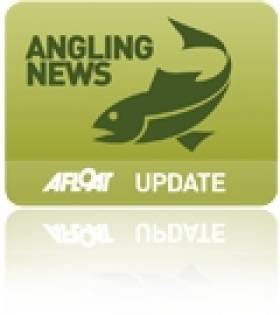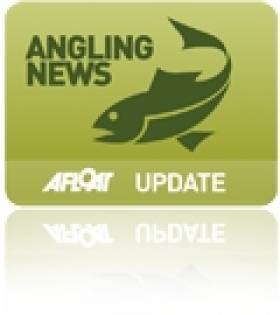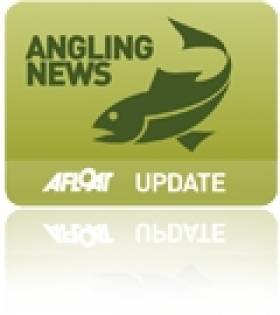Displaying items by tag: angling
Second Irish Fly Fair Set To Be Bigger and Better
#ANGLING - The Irish Fly Fair and Angling Show at the Galway Bay Hotel next weekend be "the biggest of its kind in Ireland", hosting the largest number of fly tyers and trade stands from over 15 countries, according to organisers.
The two-day exhibition, now in its second year, will welcome some of the world's top fly tyers and angling celebrities to Salthill.
As with the first event last November, visitors will have the opportunity to learn from the world's best fly dressers and casters, with tuition provided by APGAI Ireland.
Returning angling celebs Hywel Morgan, Glenda Powell, Stevie Munn, Paddy McDonnell, Peter O’Reilly will be joined by newcomer Scott MacKenzie to advise on all aspects of fly fishing.
Among the new events this year is the youth fly tying competition, giving younger anglers a chance to show the pros what they can do.
Experts from Inland Fisheries Ireland, the Wild Trout Trust and many more will also be hosting talks and seminar on various angling-related topics.
And all that is aside from the huge trade aspect of the weekend.
"Building on the success of last year’s show, where business was brisk, the 2011 show has attracted trade from all over Europe who are keen to come to Galway and exhibit to the Irish market," said organiser Grace McDermott.
For more details on the second annual Irish Fly Fair and Angling Show visit www.irishflyfair.com.
Interim Harbour Opens at Greystones
#MARINA– Greystones Harbour developer is considering whether there is enough demand to open the planned Greystones marina next Summer following the opening of the interim harbour to the public last Saturday (November 5th).
Initial marina plans focussed on the installation of a 200-berth facility but subsequent market research cast doubt on whether the marina could be filled in the downturn. The research also showed that 80% of the berths required would be less than eight metres.
The new interim harbour consists of two public slipways, also beach launching facilities, boat compounds for the Sea Scouts, Rowers, Divers, Sailors and Anglers. The South Harbour Wall and the beach are now available for walking, opening it up for all to use according to Cllr. Derek Mitchell.
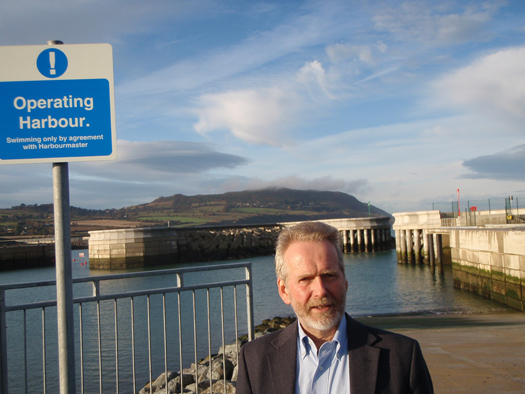
Councillor Derek Mitchell at one of the new slipways now open at Greystones harbour
‘The boat launching facilities are the best in the country and will provide adults and the youth with great sporting opportunities’. The photo shows Cllr Mitchell standing at the top of the new slipway, Mitchell said.
Nama have said they hope to make a decision soon as to whether to fund stage 2 consisting of the Primary Care Centre, five clubhouses and a much better quality finish for the Public Square than at present. The Coastguard and the Council are considering going to tender to construct the Coastguard station. ‘I hope these proceed soon so we can finish the job’ the Councillor added.
All Afloat's Greystones Harbour News here
Fáilte Ireland Highlights 'Huge Potential' of Marine Tourism
#AQUATIC TOURISM - Water-based activities from kayaking to surfing to diving have a "huge potential" for Irish tourism.
That was the message from Fáilte Ireland's Outdoor Adventure and Activity Forum in Westport, Co Mayo this week, The Irish Times reports.
Figures announced at the forum showed that angling tourism accounted for €58 million in revenue, while surfing attracted 52,000 visitors - a low number considering Ireland's growing reputation in the sport.
Fáilte Ireland's Brian Maher said that the agency is working on a new strategy for aquatic tourism to take advantage of Ireland's potential in the area, aiming to develop activities from angling to cruising and sailing to surfing.
“One of Ireland’s great strengths has been in angling," he said. "There is still tremendous potential there for that core group of anglers.
"It is incumbent on us to develop this and other water-based activities properly because there is so much potential there.”
Wexford To Host Winter Shore Angling Festival in January
#ANGLING - The 24th Winter Shore Angling Festival will be hosted on Co Wexford's east-facing beaches from 26-28 January, the Gorey Guardian reports.
Ireland's Dave Roe will be aiming to repeat his winning effort last year in a strong field of contenders that will also include UK match angling greats Alan Yates and Chris Clarke.
Codling, whiting, dab, coalfish and rockling will be the top catches over the weekend competition, which last year had a total prize fund of more than €8,000.
And even those not competing will get a lot out of watching the best match anglers using the latest equipment and techniques to gain the edge over their opponents.
The festival entry fee is €150 and includes a presentation dinner. For further details and entry information, contact Warren Doyle at 086 806 9961 (evenings only) or [email protected].
The Gorey Guardian has more on the story HERE.
Catching Your Dinner Off the West Coast
Deep sea fishing is alive and well off the west coast of Ireland, and not only is it a hugely enjoyable sport - just one catch can be enough to feed the whole family.
That's what The Irish Times' Elizabeth Birdthistle discovered in the last of her series on catching your dinner in Ireland.
Birdthistle set out for the waters off Inis Boffin with John Brittain, who has been skippering his angling boat Bluewater for 20 years for the charter fishing season between April and October.
The boat takes up to 12 anglers who are more than eager to pay €70 a head to catch large cod, pollack and mackerel in abundance. Even novices are welcome, as the fee covers all rods, tackle and tuition.
Squid and octopus are also on the cards, as are some larger quarries such as sharks and ray - though these can only be fished in a tag-and-release programme. Smaller catches also get thrown back to propogate.
"The biggest shark caught here weighed 150lbs," writes Birdthistle, "and, as with all sharks caught, Brittain must tread with caution to release the giant hook or else the shark returns to the deep with part of his hand.
"The tagged sharks have been caught as far away as the Grand Banks off Newfoundland and the Cape Verde islands."
The Irish Times has more on the story HERE.
Bass Fishing Permit Refusal is Welcomed
Environmentalists have welcomed the decision by the Minister for the Marine to refuse a permit for commercial sea bass fishing in the Celtic Sea, The Irish Times reports.
The Friends of the Irish Environment hailed Minister Simon Coveney's retention of the total ban on commercial exploitation of sea bass stocks.
Anglers are only permitted to keep two of such fish measuring more than 40cm in any 24-hour period.
There has been much opposition to the proposal by the Federation of Irish Fishermen to lift the ban on commerical bass fishing.
The species has been on the protected list for more than 20 years but this protection was only made permanent in 2006.
Many Angling Boats Suffer Engine Failure - UK Coastguard
"Many of our angling-related incidents this year have involved angling boats suffering engine failure and having to be towed to safety by lifeboats," says Mario. "This sort of incident doesn't only happen to anglers but is avoidable if you ensure that your engine and boat are well maintained and capable. It may be also be useful to take a set of oars or a spare engine with you. And make sure that you know how to raise the alarm should something go wrong.
"Several angling boats also sank this year causing some anglers to fall into the water. Some were not wearing lifejackets or buoyancy aids when they were rescued; they were very lucky indeed.
"As a search planner, I know that it's really difficult to find a person who is not wearing a lifejacket, if they are still afloat, in a vast expanse of water. Wearing a lifejacket will keep you afloat, despite the effects of cold shock, hypothermia, disorientation, injury or weather conditions. It will also hugely improve your chances of being found by rescuers.
"A couple of months ago one angler in particular, whose boat had overturned at night, was not only kept afloat by his lifejacket, but was located by the helicopter search light picking out the reflective strips on his lifejacket. He was taken to hospital in poor condition, but made a full recovery; and no doubt owes his life to the £30 "life insurance" he invested in that lifejacket.
"Some anglers have fallen from rocks and cliffs in to the sea and suffered severe injuries. These areas, by their very nature are slippery, adjacent to deep water, big swells and tide rips and are very difficult to climb back on to should you fall in the water.
"In a recent very tragic incident, a lone middle-aged angler went to fish from rocks. He never returned. To date, despite intensive searching, nothing has been found of him or his gear; and his car was in the car park where he left it. He did not use a lifejacket or mobile phone and had not told anyone where he was going. If you're fishing in a place where you are likely to fall, slip or capsize, into deep, or fast flowing water especially where it will be difficult to get out wear a lifejacket. It could save your life.
"There have also been a few close calls with anglers and bait collectors getting cut off by tides, one in particular, a non swimmer, was up to his neck in water when rescued. So remember to check tidetables before you set out and don't take risks – the tide comes in more quickly than you think."
Angling from kayaks is an up and coming sport but I am pleased to report that it's causing us no real problems at the moment. One small issue is that members of the public report them to the Coastguard because they think that they are in trouble, due to their small size and inactivity. So if you're a kayaking angler let the Coastguard know where you are going and when you expect to leave. Other good safety advice is to get a buddie, get trained, carry the appropriate safety gear, name your kayak and join the Maritime and Coastguard Agency Small Boat Safety Scheme (CG66), it's free and could save your life, full details here: http://www.dft.gov.uk/mca/mcga07-home/emergencyresponse/mcga-searchandrescue/cg66.htm
"As well as providing search and rescue coordination for the whole of the UK coastline, HM Coastguard also covers some inland waters such as the Norfolk Broads and some lakes, loughs and lochs. However, my advice is relevant for all anglers, whether salt, freshwater or both.
"You are invited to complete a survey on the wearing of lifejackets and then watch a short video about them, this can be found on line from the following link; please help us to help you."
http://feedback.mcga.gov.uk/v.asp?i=34223yhqfn
Stay safe – The rules are simple –
Before heading out onto the water, or any other potentially dangerous area:
get trained;
familiarise yourself with the area (in good weather and daylight);
get local advice;
check weather and tides;
wear a lifejacket if appropriate;
avoid alcohol;
keep in touch. (tell someone where you are going and when you will be back and let them know any change of plan, and who they should call if you do not return); and
fish with a friend.
Every coastguard station will provide free information leaflets and booklets covering the above. Visit you local station and see what is available.
Remember, the Coastguard is there for all water users including anglers, so if you or someone else is in trouble on or in the water, including medical problems, dial 999 and ask for the Coastguard or call us on VHF Channel 16.
Notice of Angling Reservoir Closures in Northern Ireland
Northern Ireland Water has announced that some of its reservoirs will be closed to angling temporarily from next January to facilitate refurbishment work.
The water levels on the reservoirs in the DCAL Public Angling Estate work be lowered on a phased basis from next year by Northern Ireland Water.
Ahead of that work, fisheries staff will be reducing fish stocks in the interest of welfare.
The fisheries will be closed from the start date of the works until the refurbishment work is completed, water levels restored and stocking re-commenced stocking, which could take up to a year.
Anglers will be notified of the details of the temporary closures of Public Angling Estate waters on the Department’s website
Full details will be available online for anglers at www.nidirect.gov.uk/angling.
Closure dates (subject to change) are listed below:
Portavoe - January 2012
Copeland - January 2012
Lough Mourne - April 2012
Lower South Woodburn - November 2012
Middle South Woodburn - March 2013
Upper South Woodburn - August 2013
North Woodburn - January 2014
Bumper Catch at Rock House Fishery
Described by The Irish Times' Derek Evans as "one of the Great Fishing Houses of Ireland", the Rock House fishery in Co Mayo boasted banner numbers of salmon and sea trout catches this spring and summer.
April started off strong on the Owenduff River in Ballycroy, with three spring salmon weighing between 9.5lb and 12lb landed in the first two weeks.
This was followed by respectable numbers in May of 30 salmon and three sea trout. But June and July were the bumper time for angling, with thundery rain aiding the catch.
Even August proved bountiful despite lacking in fresh grilse, with 12 salmon ad 27 sea trout caught throughout the month.
"Drift netting laws appear to be having a positive effect," said Rock House's Sibylle Geffroy.
The Irish Times has more on the story HERE.
Salmon Return to the Tolka After More Than a Century
Dublin has yet another thing to celebrate with the news that wild Atlantic salmon have returned to what was long regarded as the dirtiest of the capital's inland waterways.
The Irish Independent reports that the fish have been spotted along the banks of the Tolka between Glasnevin and Finglas for the first time in at least 100 years.
Efforts to clean the river in recent years, as well as the removal of man-made weirs, are thought to have aided the recovery of the Tolka, which now provides plentiful nutrients for migratory fish.
Atlantic salmon in particular are considered by scientists to be a 'bio-indicator' in that they require a very high standard of water, so their presence in a given area defines it as a healthy environment.
The Tolka joins the Liffey and the Dodder in the list of Dublin rivers hosting thriving stocks of young fry in what has been a bumper year for salmon angling across the country.
The Irish Independent has more on the story HERE.



























